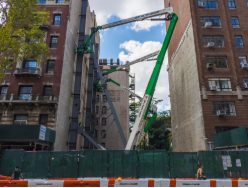Welcome to the September 2025 edition of MHH's Condo/Co-op Digest. We hope our readers enjoyed their August holidays as much as we did and that all of their summer capital improvement projects are all underway and on schedule.
This newsletter explores the emerging legal topics and issues affecting the condominium and cooperative services industry. Thought-leading attorneys from Moritt Hock & Hamroff’s Condominium and Cooperative Services Practice Group share their legal insight, experience and best practices on this rapidly evolving area of law.

Livvy Dunne Puts Co-op Purchase Approval Process Back In The Spotlight
Former LSU gymnast and social media influencer Livvy Dunne made headlines over the summer by being rejected by a New York City co-op board from her attempted purchase of Babe Ruth’s former apartment. In suffering this indignity, Ms. Dunne (together with her partner, MLB pitcher Paul Skenes) joined a lengthy list of celebrities, including Madonna, Calvin Klein, and Barbra Streisand, to have been rejected by a Manhattan co-op board over the years.
With some exceptions (more on that below), boards have wide discretion to approve or reject applicants so long as they do not discriminate against applicants based on race, color, religion, national origin, familial status, disability, or other protected characteristics under fair housing laws.
Generally speaking, co-op boards will consider a broad spectrum of hard and soft factors in deciding whether to approve a sale to a prospective purchaser, including financial stability and creditworthiness, employment history and income verification, personal and professional references, perceived compatibility with building culture, and lifestyle factors that might affect other residents.
In order to help boards make these decisions, they typically demand applicants submit an extensive application package of financial documents, followed up with reference checks and face-to-face interviews.
Readers of this newsletter will recall that New York City legislators have from time to time attempted to curtail this broad board discretion in the co-op application process, by introducing so-called “reasons” legislation, which would require co-op boards to give reasons for denying any purchase and sale applications. The most recent proposal would have required that, in the event a prospective purchaser is disapproved, the co-op would be required to “provide the prospective purchaser with a written statement of each and all of its reasons for withholding consent no later than five business days after it has made its decision to withhold consent.” All reasons for withholding consent must be stated “with specificity,” including, among other things, “identifying each element of the prospective purchaser’s application which was found . . . to be deficient; any specific ways that the application failed to meet any specific policies, standards or requirements . . . , and the source of any negative information relied upon” by the co-op board.
Although this legislation did not (and has not) passed in New York City, similar requirements have been enacted elsewhere, such as in Westchester and Suffolk Counties. Meaning that if Ms. Dunne had been rejected by a co-op board in Yonkers instead of one on the Upper West Side, we would know exactly the reasons why.
- With Alex Litt

Co-op Boards May Not Use "Arbitrary" Sales Price Targets To Reject Purchase Applications
We noted above that as a general matter, co-op boards have wide discretion to reject purchase applications “for any reason or for no reason.” In fact, unless there are bona fide allegations of unlawful discrimination against an applicant, courts will usually find that the business judgment rule protects boards from any further scrutiny for a decision to deny its consent to a sale.
In Stromberg v. East River Housing Corp., 2025 WL 2412639 (1st Dep’t Aug. 21, 2025), however, the Appellate Division highlighted another potential limitation on board decision-making: unreasonable and arbitrary price floors.
In Stromberg, the plaintiff sued the co-op because the board had rejected her application to sell her apartment for $520,000. She subsequently amended the sales contract to $540,000 and was told by the co-op’s management company that the sales price “was still too low” and that “the Board would not approve a sale with a purchase price lower than $600,000.” Believing that the board’s price floor was arbitrary and an unreasonable restraint on trade, Stromberg sued the co-op, and the co-op moved for summary judgment dismissing the claim.
In affirming the motion court’s denial of summary judgment, the First Department found that while it is permissible for a co-op to consider an apartment’s sales price when deciding to grant or withhold consent to a sale, but if the sole factor in the board’s decision was “an arbitrary price floor unrelated to the unit’s market value,” that could be an abuse of discretion and an unlawful restraint of trade.
As a consequence, there will be a trial on the issue of whether the board’s “target” price was reasonable and supported by the evidence.
As an added bonus, the appellate court also addressed the enforceability of attorneys’ fees provisions in proprietary leases we discussed in the June 2025 edition of the newsletter. Here, the court found that because East River’s attorneys’ fees provision was “substantially identical” to the provision ruled unenforceable in Matter of Krodel v. Amalgamated Dwellings Inc., 166 A.D.3d 412 (1st Dep’t 2018) (striking down provision that would “permits the landlord to recover attorneys’ fees when the tenant brings an action against the landlord even when the landlord is in default”), East River could not recover attorneys’ fees here even if it were to ultimately prevail in the case.
This becomes yet another warning to co-op boards that, depending on how their proprietary leases are drafted, their ability to shift attorneys’ fees to shareholders may not withstand scrutiny if challenged in court.

State Legislature Passes Amendment To Law Governing Access To Neighboring Properties
Whenever a developer constructs a new building, or when a co-op or condo board undertakes a Local Law 11 façade repair project, the law requires them to protect the surrounding areas, including at adjacent buildings. That, in turn, means getting permission to enter the neighboring properties to install and maintain required protections.
If the neighbors do not voluntarily enter into an access agreement, the property owners may seek a court order under Section 881 of the New York Real Property Actions and Proceedings Law (RPAPL), which governs access to neighboring buildings, allowing courts to grant licenses “upon such terms as justice requires.”
We have written elsewhere about the cumbersome process of gaining access to neighboring properties and the limitations RPAPL 881 as a remedy, as well as about previous legislative efforts to amend the statute to make it easier for property owners to gain needed access.
Over the summer, an amendment to RPAPL 881 passed the New York State legislature, meaning that it is a Governor Hochul signature from becoming the law. If enacted, the amended RPAPL will, among other things, obligate parties to act in a “commercially reasonable” manner in reviewing the terms of proposed access, and give courts the right to award attorneys’ fees if either party “acted in bad faith or engaged in willful misconduct in seeking, denying, or conditioning its approval” to access.
The hope here is that by adding some teeth to RPAPL 881, neighboring property owners will be forced to act more quickly and more fairly in arranging for access, thereby eliminating a common source of delay on these types of construction projects.